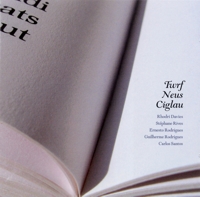| Twrf Neus Ciglau Rhodri Davies - harp, electronics |
|
| Please click here for other recordings by Rhodri Davies |
| TRACKS | ||
| 1 | I | 34:18 |
A single 34-minute improvisation with harp, soprano sax, viola, cello, and electronics, none of these instruments being used conventionally or producing instantaly-recorgnizable sounds. Restrained improv, where it is played and left unplayed are equally important, where sounds rarely clash, without actually falling down to complacency. Esthetical rapture.
François Couture (Monsieur Délire)
Perhaps close to what one would expect: scratchy, thin drones punctuated
by the rubbing of friction-filled surfaces, much air and space. It
is all that, but also injects a kind of mystery--maybe it's the deep
tolling that occasionally rises from the cello or a bit more emotive
summoning from Rives. So, familiar yes, but fine integration of sounds
and well paced, with verdant hills and valleys as well as the odd cwm.
Brian Olewnick (Just Outside)
This quintet was captured on tape at 2008 at Lisbon's "Música Portuguesa Hoje" festival. The instrumentation comprises harp, soprano sax, viola, cello and electronics, the character of the performance definitely oriented towards "disquietingly acoustic" regions, all sounds tactfully positioned in barely ruptured reticence.
The set begins with a subdued measured escalation of electroacoustic humus in which we already notice a series of minimal movements drawing our absorption closer. After five minutes or so, strings become the object of a deeper attention in a superb superimposition of opaque droning and minutely introspective percussion, solitary notes and meagre plucks slightly altering an otherwise semi-frozen inspection of the propagations of these sounds in a restricted space. The electronics remain perceivable amidst skilled spurts: they keep coming in and out, either shuddering or just audible, the unclothed beauty generated by the arc of a noiseless whisper, a mere unbroken hiss enhanced by the air flowing through the saxophone's conduits.
The upper partials, principally in the higher ranges of the instruments, constitute the cutting blade that filters humdrum off reflection, an ever-difficult task in an improvising group, yet in this case a nonexistent problem given the inner-ear depth shown by the participants. The alternating of piercingly scraping layers of raucously squealing pitches with sections whose quintessence can be individuated in a fusion of quasi-silence and wretchedly foggy reverberation is the very basis of a masterful despoliation of the harmonic tissue, often punctuated by impressive convergence of timbres that almost sound pre-planned but surely aren't. Those are the instances in which the music flourishes entirely and, at large, the validating paradigm of the superiority of responsive give-and-take as opposed to the routine-drenched execution of a well known practice — something that, for example, onkyo has come dangerously close to nowadays. In a word, we detect the wholesomeness that free improvisation should hypothetically warrant, a lost quality in the bulk of modern "art" where counterfeit commitment soon morphs into trendy posture.
In the last third of the program the musicians appear intent in finding a definite place for each instrument, not exactly infringing rules, rather continuing to look for the ideal balance between uneasiness and unprocessed resonance. The stridency characterizing the instinctive counterpoint around the 28th minute is an example of this, and the restlessness of never-resolving "chords" finally gives room to a sort of conclusion in which the breathing, although still restrained, becomes somewhat more regular, if always with an eye open, nerves not allowed to relax completely.
A significant piece of work, especially when considering that it was recorded live (luckily, audience and metropolitan noises — often seriously distracting factors — remained outside this time), Twrf Neus Ciglau easily ranks among the best in the recent cluster of releases by the horizon-expanding Creative Sources label.
Massimo Ricci (The Squid’s Ear)
| Title: | Twrf Neus Ciglau |
| Artists: | Rhodri Davies -
harp, electronics Stéphane Rives - sprano saxophone Ernesto Rodrigues - viola Guilherme Rodrigues - cello Carlos Santos - electronics |
| Genre: | Electronic, STYLE: Free Improvisation, Minimal |
| Format: | CD |
| Our Ref: | A0363 |
| MCPS: | CS 156 cd |
| Label: | Creative Sources Recordings |
| Year: | 2009 |
| Origin: | Portugal |
 Perhaps
close to what one would expect: scratchy, thin drones punctuated
by the rubbing of friction-filled surfaces, much air and space.
It is all that, but also injects a kind of mystery--maybe it's
the deep tolling that occasionally rises from the cello or a bit
more emotive summoning from Rives. So, familiar yes, but fine integration
of sounds and well paced, with verdant hills and valleys as well
as the odd cwm. Brian Olewnick (Just Outside)
Perhaps
close to what one would expect: scratchy, thin drones punctuated
by the rubbing of friction-filled surfaces, much air and space.
It is all that, but also injects a kind of mystery--maybe it's
the deep tolling that occasionally rises from the cello or a bit
more emotive summoning from Rives. So, familiar yes, but fine integration
of sounds and well paced, with verdant hills and valleys as well
as the odd cwm. Brian Olewnick (Just Outside)